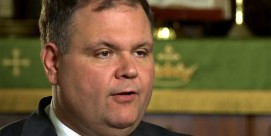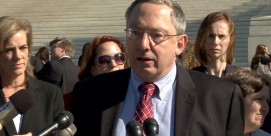David Davenport: A Good Speech, But Will It Do Any Good?
A minister friend used to say: “It’s hard enough to give a good sermon, harder still to give a sermon that will do any good.” A large congregation awaited Mitt Romney’s sermon this morning, especially in Iowa, as he sought to explain his faith and how it would inform his presidency. It was a good speech but, given all that he needed to accomplish, it seems doubtful that it will do enough good to propel his campaign through Iowa and other tough Republican primaries.
Romney faced high expectations and an almost impossible dilemma as he delivered this message. On one hand, the American people as a whole are ambivalent about the matter of faith and religion in their public leaders. They want leaders who are religious enough to have strong personal values, but who are not too religious in the sense of looking to God to tell them which policies to adopt. That has historically been a fine line for any candidate to walk, but it has become more difficult in recent years because of the rise of evangelical Christians as a political force and the very different expectations they bring to religion in public life.
One way to assess the speech, then, is to identify the several audiences Romney needed to address and the messages they needed to hear:
1) The average American voter who wants religion, but not too much:
Here we could give Romney’s speech high marks on content, but a lower grade on timing. The timing problem is that the American people generally aren’t really paying attention yet to Mitt Romney and the stage full of Republicans running for president. If average Americans know, or care, that Mitt Romney is a Mormon, it is still not clear they know what that means. So, for the broad range of American opinion, this speech should have been given earlier, when Romney first entered the race, or later, as Kennedy did mere weeks before the general election when people were alert to the issues.
Still, the content was good in that what the average American wants to hear is that a candidate is committed to faith — we’re still not ready for an atheist as president — and that this faith has produced strong character and values in the candidate’s life. Romney’s appeal to the founders and to our history demonstrated that his faith stands in a strong, mainstream tradition. He referred not so much to the particularities of his church but to the “great moral inheritance we hold in common.” His faith is witnessed, he said, in his “marriage and family.” This would have been a good speech if the average American voter was his most important audience. But the speech wouldn’t have garnered as much attention if that were its main object.
2) Iowans (and other voters) concerned about a Mormon as president:
This was the audience people have assumed Romney needed to reach with some kind of explanation of Mormonism that would fit it into the mainstream of American faith and provide a defense against religious discrimination. Dealing with the particularities of Mormonism would have been too difficult in a short, national speech and was wisely not the tack Romney took. Instead, he sought to build a larger frame around his Mormon faith, one that placed it in the great middle of American values.
First, he explained that his was the faith of his fathers and he “will be true to them and to my beliefs.” Most Americans “inherit” their faith and will understand his loyalty. Then he addressed his beliefs about Jesus Christ, affirming that “Jesus Christ is the Son of God and the Savior of mankind,” admitting that his church had “its own unique doctrines and history,” without addressing them specifically. In fact, he said that defending his church’s particular views would mistakenly make him a “spokesman for his faith” and would acknowledge that there was some kind of religious test for candidates. Instead, he said, we should focus on the “common creed of moral convictions” we all share.
This part of the speech should satisfy many, but not all, who are concerned about a Mormon president. Frankly, I think it’s easy to overestimate that concern since polls say people who express it generally don’t even know much about Mormonism. But this is probably as far as a candidate can or should go in dealing with the particularities of his religion. Just as John Kennedy did not deal with the specifics of Catholicism, Romney should build a larger frame around his beliefs and let it go at that, again earning relatively high marks here.
3) Evangelical conservatives who vote in Iowa and other Republican primaries:
At this stage of the campaign, this is Romney’s most important audience for a speech on faith, and here he receives lower marks. The new force in Republican politics in the last decade is the relatively large and active group of evangelical and other religious and social conservatives. This group accounts for 30 percent of the GOP voting base, and perhaps as much as 50 percent in Iowa. It is also a highly energetic bloc that can turn out votes and communicate its message.
Unfortunately, it is not clear that Romney and his faith message can reach that group. So far this bloc, which helped elect George W. Bush, has been unable to agree on any candidate for president in 2008. In just the last couple of weeks, many evangelical conservatives in Iowa have concluded that Mike Huckabee, a Baptist minister, could in fact win if they got behind him, so support has been shifting away from Romney and toward Huckabee. One estimate is that two-thirds of Huckabee’s support in Iowa comes from this group and only one-third of Romney’s, so this is the key religious group for Romney to reach at this moment.
Romney’s speech is not likely to sway this group. In fact, Romney is not a great match for evangelicals. Mormons come from a different religious tradition and culture than evangelicals, and Romney’s religion naturally informs his values, convictions, and personal life more than it does his policy positions. But evangelical conservatives want precisely the opposite: they want to hear that a candidate is taking a particular stand on abortion and other social issues because of his faith. Romney’s speech came close at one point, acknowledging that the “right to life” is a movement of conscience like “abolition or civil rights.” But then he moved on. This will probably not be enough connection between faith and stands on issues to satisfy evangelical conservatives that Romney is their man.
One of the difficult aspects of presidential campaigns is you have to stir up your own base and win primaries, but also be able to move toward the center and win general elections. Romney’s speech would have worked well next fall in appealing to the broad American voter base with his message of faith and values. But if the evangelical and social conservative voter group is as important to winning the Republican nomination as it appears, Romney may not satisfy them sufficiently to win primaries and make it to the fall general election campaign. It was a good speech, but may not do enough good with the one audience Romney most needs to reach right now, evangelical conservatives in Iowa and in other Republican primaries.
David Davenport is a research fellow at the Hoover Institution and a professor of public policy at Pepperdine University. He teaches a course on “The Strategy and Rhetoric of Modern Presidential Campaigns”







